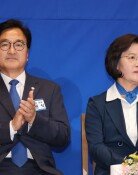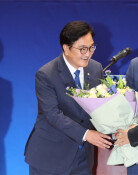Inter-Korean talks on denuclearization
Inter-Korean talks on denuclearization
Posted April. 18, 2011 04:12,
South Korean Foreign Minister Kim Sung-hwan and U.S. Secretary of State Hillary Clinton agreed Saturday to hold inter-Korean dialogue on denuclearization to resume the stalled six-party talks. South Korean President Lee Myung-bak confirmed holding the bilateral dialogue in a meeting with Clinton at the presidential office of Cheong Wa Dae Sunday. Both countries conditionally opened the door for the inter-Korean dialogue at the request of China and North Korea for gradual resumption of the six-party talks. China`s chief nuclear negotiator Wu Dawei and his North Korean counterpart Kim Kye Gwan proposed after talks Monday last week a three-step dialogue approach on resuming the six-party talks: inter-Korean dialogue; meetings between North Korea and the U.S; and finally the resumption of the six-party talks.
The six-party talks have been in a deadlock since December 2008 and North Korea conducted its second nuclear test in May 2009. The multilateral dialogue seems no longer useful because five of the parties failed to prevent the North from arming itself with nuclear weapons. China, the chair of the talks, is largely responsible for the situation. Beijing, the sole party among the participants that keeps in touch with Pyongyang, has effectively given up its effort to prevent the North from developing nuclear weapons.
The operation of the talks, the direction of which has been set by Washington and Pyongyang, should be revamped. The U.S. handles nuclear issues as part of its world strategy. Therefore, if urgent issues arise such as pro-democracy protests in the Middle East and Afghanistan, the North Korean nuclear issue is put on the backburner. For its part, Japan has utilized the denuclearization talks as an opportunity to resolve North Korea`s kidnappings of Japanese citizens. The first target of Pyongyang`s nuclear weapons is Seoul. Recently, Pyongyang openly threatened to obliterate Seoul with nuclear weapons. The talks between the two Koreas chief nuclear negotiators can help reinvigorate the six-party talks.
If the inter-talks are held, Seoul and Washington should demand that Pyongyang show its seriousness on denuclearization first by urging the communist country to stop its uranium enrichment program, nuclear tests, and ballistic missile launches as preconditions. If words are not followed by action, this will lead to the mistake of accepting Pyongyangs false promises. When the North was under heavy global pressure to allow nuclear inspections after the release of photos of the nuclear facility in Yongbyon, the communist country held inter-Korean talks and agreed on a joint declaration on denuclearization of the Korean Peninsula. The North, however, reneged on its promise to abandon nuclear weapons. If North Korea wants to repeat its past practice of using inter-Korean talks as a mere formality for dialogue with the U.S. and the six-party talks, the Stalinist country will be continuously subjected to international sanctions and punishment.







